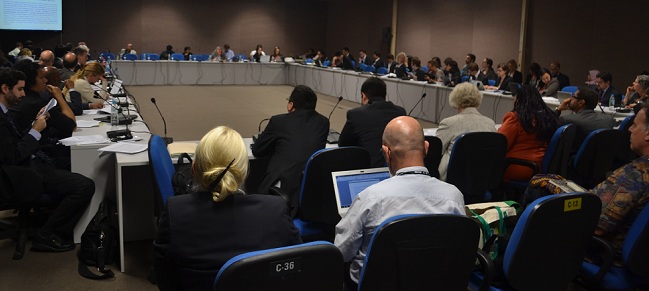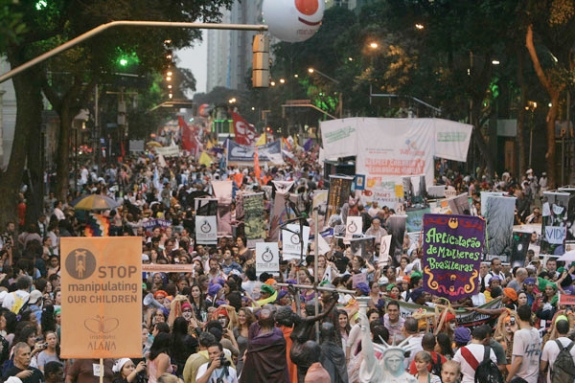…and then Rio+20 is over. What to do now? Keep Fighting!
I’ve always been told that young people can make a difference. So when I was offered the opportunity to join a delegation to the UN Earth Summit (Rio+20), I thought it might finally be my chance to do something meaningful for my country, Brazil. The high level talks of Rio+20 lasted three days (20-22), during which world leaders were supposed to get together to somehow discuss the future of the planet.

Countries' negotiators during the last round of the preparatory committe
Things started really slowly - and remained slowly ’till stop by the end. Discussions about topics like the transitioning to a green economy and ocean conservation seemed significant and controversial - countries argued back and forth and did not seem close to consensus. I worried that by spending so much energy on arguments, countries would not only loses the chance to agree to binding and participatory solutions, but the outcome of their efforts would lack a wider vision and understanding of the needs of the present and future. And, by the end, I was right to be worried.
As deadlines loomed and the end of preparatory meetings drew near, the government of Brazil took the lead with only one goal: put an end on the discussion, no matter what. On Tuesday, june 19th, they came out with the final version of a draft outcome document called The Future We Want.

"It does not represent us", states the banner
The Future We Want reflects the disagreements I saw between countries in exactly the way I feared. It’s so weak and lacking of the kind of commitments and clear goals that would drive significant change - there was nothing left to disagree with. Countries agreed by consensus to pass the draft text on to their leaders for the high-level segment.
While Brazil accomplished the job of completing the text, they failed to take into consideration some of the most controversial (because they’re important) issues, e.g. who is going to pay the bill? When will we have clear targets? How will governments assure the protection of natural resources, promote equity as well as develop itself in a greener way? The concept of green economy is still not enough clear, which means we don’t have a clear path forward.
Civil society’s evaluation is that Brazil, in order to achieve the consensus, has swept the controversial subjects under the rug. It is frustrating. With all these leaders gathering in Rio, it feels like a waste of time and resources - and a tremendous waste of opportunity.
The feeling in the halls was that the world is distracted. The richest nations, for example, spent the first half of that week focused on a G20 meeting in Mexico, where the topic at hand was how to stave off a global recession. According to Brazil’s negotiator Ambassador André Correia do Lago, “The crisis certainly influenced in the outcome of Rio+20, mainly because of its impact in the northern countries. Therefore, the level of ambition in the area of technology transfer, for example, was affected.”
As Heads of State and Governments were stepping into the picture, I was no longer allowed into the negotiating rooms. While I was happy to no longer spend my days watching country’s negotiators argue over the placement of commas and sentences in the negotiating text, it felt strange to watch my future be decided via big screens, where only the least controversial high-level meetings were projected on the walls outside the official meeting areas.
So I left. Over 200 people walked out of the Conference, because we did not believe in its outcome. Below, an amazing video for those who were not there to be inspired by what is sometimes necessary to be done.
As a young Brazilian, my evaluation is that the text as it was agreed was a great setback in the sustainable development path. It was agreed by 193 delegations, but it did not reflect satisfaction or consensus. Especially given how we understand the profound social and environmental challenges we’re facing. We know so much more now than we did at the first UN Earth Summit in Rio 20 years ago, yet we were headed toward an outcome that was even less ambitious.

Over 50 thousands of people marching in the streets of Rio de Janeiro for social and environmental justice
However, let’s not be that disappointed. If the Rio+20 taught us a lesson, it was: we must keep fighting! Whatever we have accomplished, it is because someone, somewhere and sometime in the past fought for it. We are building a huge movement. Thousands of people from all over the world got together because they - we - believed we could make that great longing to change the world. We discussed. We proposed solutions and together made clear we will not give up - and this is why we must keep attending such conferences, trying to influence world leaders and letting the entire society to be aware about who is deciding our future and what this future is about.
I believe, if political will is raised, we can seize this opportunity to create the future we really want – reflecting the kind of difference I hoped to help make for my country. I want a future with social and environmental justice, where people have their rights respected and secured, and governments fulfill their duties to protect the environment. Each of us is aware of the future we want and now more than ever, I understand how much we’ll have to struggle to make it happen. So, let’s keep fighting. We’ll keep on fighting till the end.




About the author
Diêgo Lôbo
Giving the perspective of a young brazilian following Rio+20 talks is the goal of this environmental blogger, PR and amateur writer.
